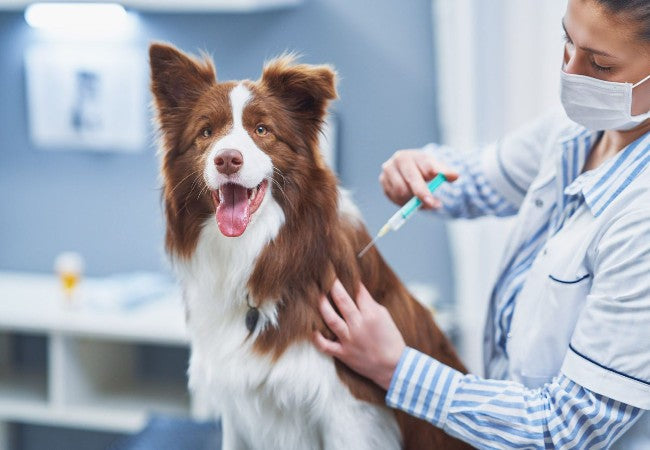Vet Approved Warning: Why You Should Never Vaccinate Your Dog or Cat Yourself (2025)🩺🐶

In this article
Vet Approved Warning: Why You Should Never Vaccinate Your Dog or Cat Yourself (2025)🩺🐶
By Dr. Duncan Houston BVSc
In an era of DIY everything, some pet parents wonder: “Can I give my pet vaccines at home?” While it may seem convenient or cost-effective, vaccinating your dog or cat yourself is a serious gamble—with health risks, legal consequences, and potentially life-threatening outcomes. As a veterinarian, I urge pet owners to understand why vaccines should only be administered by professionals. 💉🐾
This comprehensive guide will break down the dangers of at-home vaccinations, legal requirements, and safer alternatives through trusted services like Ask A Vet. 🩺📱
⚠️ The Risks of DIY Vaccination
1. 💉 Improper Storage and Handling
Most pet vaccines are temperature-sensitive. If they aren’t stored within strict cold-chain protocols (typically 35–45°F/2–7°C), they lose effectiveness. A compromised vaccine may offer no protection—or worse, cause adverse reactions. ❄️📦
2. 🧪 Contamination Risk
Injecting a pet without sterile equipment or veterinary-grade technique increases the risk of introducing bacteria, causing abscesses or systemic infections. ⚠️
3. 🚑 Adverse Reactions
Even in clinic settings, allergic reactions (anaphylaxis) can occur. Vets are trained to spot and treat emergencies with epinephrine, oxygen, and IV access—none of which you’d have at home. 💨💉
4. 🩻 Misadministration
- 💀 Injecting a vaccine intramuscularly instead of subcutaneously can cause pain, nerve damage, or failure
- 🧠 Giving the wrong vaccine at the wrong interval can stress the immune system or leave gaps in protection
5. 📋 Incomplete Records = Invalid Vaccines
Vaccines administered outside a veterinary clinic are often not recognized by boarding facilities, dog parks, or airlines. Most states don’t consider DIY rabies vaccines legally valid. This can cause major issues during bites, travel, or emergencies. 🛂✈️
📜 Legal & Ethical Issues
In many states, it's illegal for anyone other than a licensed veterinarian or certified technician to administer core vaccines like rabies. Violating these laws can lead to:
- ⚖️ Fines or criminal charges
- 🛑 Animal quarantine during a bite incident
- ❌ Voided pet insurance claims
State health departments and the AVMA strongly advise against DIY vaccination. 📚
🧬 Vaccines Are Not One-Size-Fits-All
Only a vet can assess your pet’s:
- 🧬 Breed-based vaccine sensitivity
- 📅 Custom schedule based on age, lifestyle, risk exposure
- ⚕️ Existing medical conditions that may contraindicate vaccination
Senior pets, immunocompromised animals, or those with chronic conditions may need adjusted protocols. 🧠
🧑⚕️ Safer Alternatives to At-Home Vaccination
1. 🩺 Ask A Vet
Use the Ask A Vet app to get advice on scheduling, vaccine types, and where to go for safe, affordable administration. You can even access mobile or low-cost clinics nearby. 📲
2. 🏥 Vet-Hosted Vaccine Clinics
Many communities offer monthly vaccination days at vet offices or pet stores. You still get licensed administration, official records, and safety—all at a reduced cost. 🐕🦺
3. 🚐 Mobile Vets
For anxious pets or those with limited mobility, mobile vets bring professional care directly to your door—with refrigeration and emergency equipment on hand. 🛻
🧠 Training Isn't Enough: Vet Skills Matter
Even trained professionals take years to perfect vaccine technique, injection site selection, and adverse event management. Vet techs and veterinarians have:
- 📚 Medical anatomy knowledge
- 🧬 Vaccine-specific handling protocols
- 🚑 On-the-spot emergency care skills
A YouTube video or instruction manual can’t replace years of clinical experience. 🧠🩺
🩺 When DIY Backfires: Real-Life Scenarios
We’ve treated pets suffering from:
- 🔥 Severe swelling and abscesses from dirty needles
- 💔 Fatal anaphylaxis without epinephrine access
- 🦠 Infectious disease due to ineffective, expired, or unverified vaccines
Don’t let a shortcut put your pet at risk. 💔
🐾 Proper Vaccine Schedule (Core Example)
For dogs:
- 🍼 6–8 weeks: DHPP (Distemper combo)
- 🐕 12–16 weeks: DHPP + Rabies
- 📅 1 year: Boosters
For cats:
- 😺 FVRCP at 6–8 weeks
- 🐱 Rabies by 16 weeks
- 📅 Annual or 3-year boosters based on risk
Use Ask A Vet to build a vaccine plan tailored to your pet’s needs. 🐾📋
- 📱 Ask A Vet: For real-time vaccine advice, reactions, and records
✅ Final Thoughts
Vaccinating your pet is essential—but doing it yourself is risky, potentially harmful, and in many cases, illegal. Veterinary professionals exist to ensure that immunization is safe, accurate, and recognized. 💉
Recap:
- ❌ At-home vaccines carry major health and legal risks
- 🧬 Pets need customized vaccine plans
- 🩺 Always use a licensed provider
- 📱 Use Ask A Vet for expert vaccine support
Need help now? Visit AskAVet.com or connect with your local clinic. Your pet deserves professional care—because they’re family. 🐶🐱






